ERBIL, Kurdistan Region – “The human becomes half a human when you lose a leg,” says Khalid Hassan, easing into a plastic lawn chair in the doorway of his carpentry workshop in Choman, near the Iranian border.
Like so many in this small town high in the Zagros Mountains, Khalid lost a leg treading on one of the hundreds of thousands of landmines and mortar shells that litter the Iran-Iraq border – remnants of a war that ended exactly 30 years ago.
“All of my weight is on that leg. The joints get dislocated during movement. My joints don’t settle on the ground. I am tired the whole time. The whole time,” he says.
Khalid Hassan, a carpenter from Choman, adjusts his prosthetic leg. Photo: Robert Edwards / Rudaw
On August 20, 1988, the longest conventional war of the twentieth century finally ended.
Iran and Iraq, two highly militarized oil nations, sharing a border stretching almost one-and-a-half thousand kilometers, fought a savage war of attrition.
Saddam Hussein’s opportunist attack on Iran – enfeebled by its fledgling Islamic revolution – soon became a war of national survival when Tehran counterattacked.
A million people perished and thousands more were left disfigured. The guns have long fallen silent, yet the soil here remains lethal.
“Both Iran and Iraq filled these mountains with mines,” says Hazhar Bapir, a metal worker in Choman. “You can think of it as though Iraqi and Iranian soldiers are still killing people in these mountains.”
Hazhar also lost his leg to an explosive remnant of the war. In times of austerity, and with local farming crippled by cheap foreign imports, there’s good money to be made in harvesting scrap metal left over from the conflict. Now Hazhar is confined to his workshop.
Hazhar Bapir, a metal worker from Choman, receives no disability support from the government. Photo: Robert Edwards / Rudaw
“I can’t walk on it. I have no other option but to come to work. If you look at the wound on my leg, you will be amazed I can still work. I have no rest because of it. It is because I have a family, for a livelihood, that I have no other option but to come to work,” he says.
“If the government had been helping me, I may not have to try this much.”
The Kurdistan Regional Government (KRG) lost its share of the Iraqi budget in 2014 in a row with Baghdad over independent oil sales. This was followed by a costly war with ISIS and a financial crisis in 2016.
Any limited efforts to clear the Iran-Iraq border of explosive remnants, and to help those disabled by mines, soon saw their budgets cut.
Mine clearance teams at work in Penjwin. Photo: Robert Edwards / Rudaw
‘Hidden enemy’
South of Choman is the town of Penjwin. Three decades on from the war, it remains one of the most densely mined places in the world.
“Undoubtedly this job is very dangerous,” says Awder Omer Rasoul, who leads a team of mine clearers sweeping a steep hillside overlooking the town.
“Every day we come to do this work. We aren’t sure we will come out alive because there is a hidden enemy we are searching for,” he says.
The KRG-backed team has been trained to international standards by western governments and demining organizations. They remain badly under-equipped, however, and progress is slow.
Awder Omer Rasoul, a mine clearance team leader in Penjwin. Photo: Robert Edwards / Rudaw
“The government needs to back us more,” says Awder. “For example, advanced devices, mechanical devices. These lands, especially Penjwin, have been a warzone. There are many different metals in it. If we are to cleanse them, we can’t do that manually. We have to do a full excavation.
“This requires a lot of time. That is why the government has to facilitate things for us. Mechanical machines can help clean them more easily.”
Here they are mostly anti-personnel mines – Italian and Chinese made – sold to Saddam when relations were good. Iran also planted mines here – made in the USA – an old, pre-revolution stockpile sold to the Shah.
Today they are all banned under international law.
Mines and UXO retrieved in Penjwin before controlled demolition. Photo: Robert Edwards / Rudaw
Iraq is a signatory of the Ottawa Mine Ban Treaty of 1997. Under its conventions, Iraq should have been landmine free by February 2018.
With resources pouring into western Iraq to help clear new explosives left by ISIS, the east largely fends for itself. Baghdad isn’t helping.
“As you know, the Iraqi government has signed Ottawa Treaty and they say that Iraq will be clear of mines in 2018. But it’s not realistic,” says Omer Ali Mohammed, the mine team’s section leader.
“Unfortunately, the Iraqi government never did that, it never helped this part of Iraq. So unfortunately we cannot clear this area even in another ten or 20 years.”
Jawhar Hakeem, a 14-year-old shepherd, tends a flock of sheep in the densely mined hills around Choman. Photo: Robert Edwards / Rudaw
‘They psychologically crumble’
The Diana Prosthetics Centre in Soran, a couple of hours drive northeast of Erbil, is among the best in the country – accepting civilian and military patients with all kinds of mobility needs.
“Most of the patients brought here have been injured by mines,” says Dr Majid Ahmed, an orthopedic surgeon and the centre’s director.
“They often become psychologically disabled because they have lost a part of their body. They will have difficulty working, feeding their family because they psychologically crumble.”
“After they come here, I could say more than half of them are reintegrated into society,” he adds.
State of the art materials, like super-light-weight carbon fibre and malleable silicone, are used to fashion sophisticated prosthetic parts that give the wearer incredible natural movement.
When the new limb is ready, patients are offered courses of physiotherapy and vocational training to help them rehabilitate.
But today the workshop is silent. Like mine clearance operations, the centre has also fallen victim to the KRG’s budget crisis and Baghdad’s neglect.
“Currently we have no budget left because the Kurdistan Regional Government has a low budget,” says Dr Majid.
Now the centre can’t afford its expensive materials, relying instead on used prosthetics donated from Britain and by mending broken parts for returning patients.
“This has harmed patients, as legs can't be created for them,” says Dr Majid. “They remain with their old limbs in a broken form.”




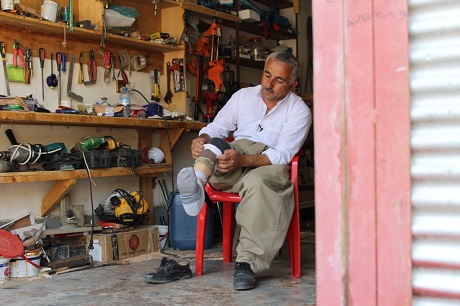
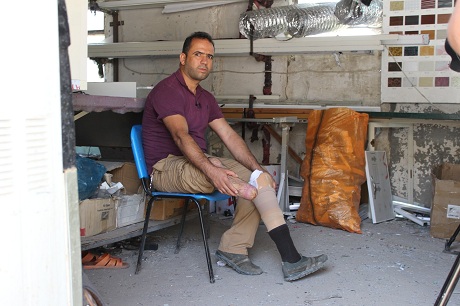
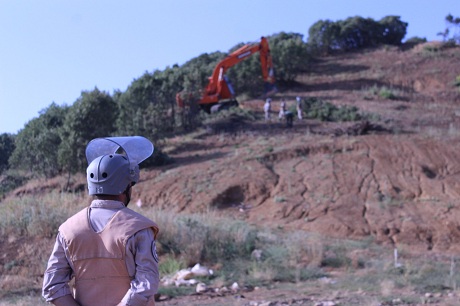
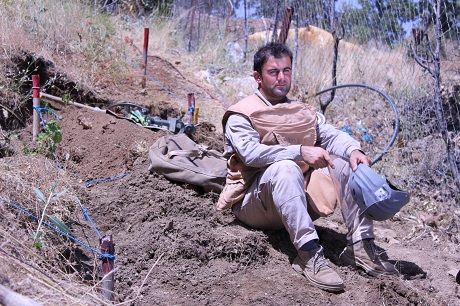
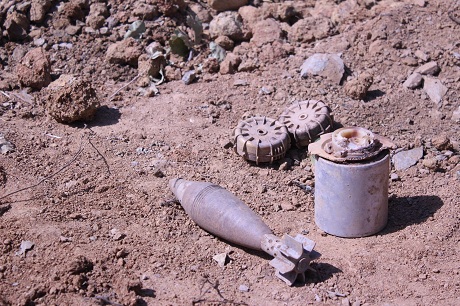
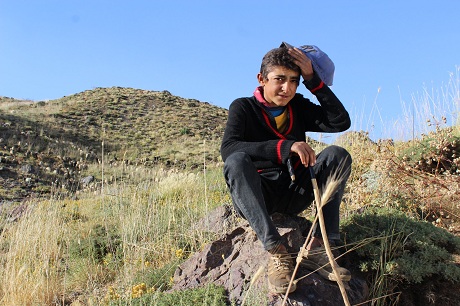
Comments
Rudaw moderates all comments submitted on our website. We welcome comments which are relevant to the article and encourage further discussion about the issues that matter to you. We also welcome constructive criticism about Rudaw.
To be approved for publication, however, your comments must meet our community guidelines.
We will not tolerate the following: profanity, threats, personal attacks, vulgarity, abuse (such as sexism, racism, homophobia or xenophobia), or commercial or personal promotion.
Comments that do not meet our guidelines will be rejected. Comments are not edited – they are either approved or rejected.
Post a comment